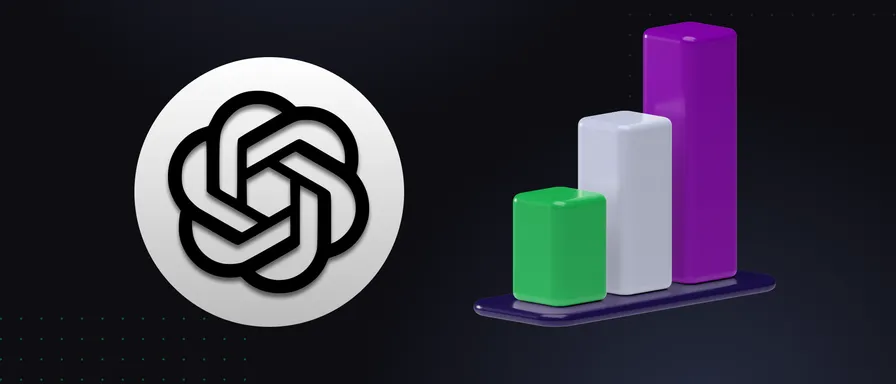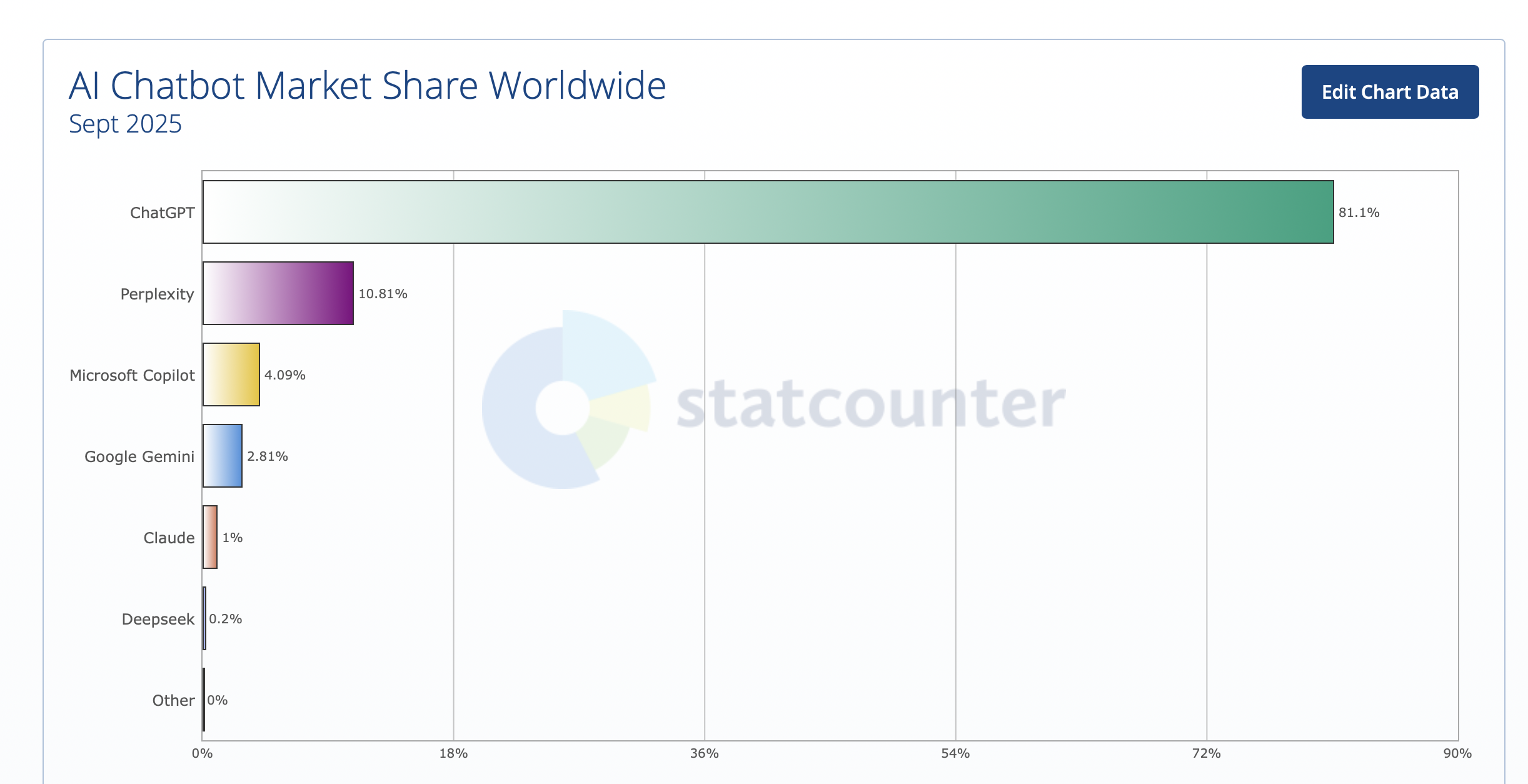- ChatGPT
- AI Search
- Perplexity
- AI chatbot
ChatGPT Holds 81% of Global AI Chatbot Market in September 2025, Data Shows
OpenAI's ChatGPT now commands 81% of the global AI chatbot market, far ahead of rivals, according to September 2025 StatCounter data.


Team Peasy
The collective voice of Peasy, covering AI visibility, analytics and generative search optimization. LinkedIn
ChatGPT’s market share
OpenAI’s ChatGPT now accounts for more than four out of every five AI chatbot sessions worldwide, new data shows, underscoring the platform’s dominance as competitors struggle to gain ground.
StatCounter figures for September place ChatGPT at 81.1% of global market share, far ahead of Perplexity (10.8%), Microsoft Copilot (4.1%), Google Gemini (2.8%), Anthropic’s Claude (1%), and DeepSeek (0.2%). No other AI chatbot registered significant share.
| AI Chatbot | Market Share (September 2025) |
|---|---|
| ChatGPT | 81.04% ▲ |
| Perplexity | 10.78% ▲ |
| Microsoft Copilot | 4.16% ▼ |
| Google Gemini | 2.81% ▲ |
| Claude | 1.01% ▲ |
| Deepseek | 0.21% ▼ |

A commanding lead
The tracking, which began in March 2025, shows ChatGPT has held a stable lead since measurements started. While Perplexity has grown into the clear second-place platform, the gap between the two is more than 70 percentage points.
| Rank | Chatbot | September 2025 Share |
|---|---|---|
| 1 | ChatGPT | 81.04% |
| 2 | Perplexity | 10.78% |
| 3 | Microsoft Copilot | 4.16% |
| 4 | Google Gemini | 2.81% |
| 5 | Claude | 1.01% |
| 6 | DeepSeek | 0.21% |
Monthly market share trend (March-September 2025)
Which AI chatbot has been the most popular so far in 2025?
| Month | ChatGPT | Perplexity | Microsoft Copilot | Google Gemini | Claude | DeepSeek |
|---|---|---|---|---|---|---|
| March 2025 | 80.1% | 9.4% | 5.3% | 3.2% | 1.4% | 0.4% |
| April 2025 | 79.6% | 9.8% | 5.0% | 3.1% | 1.2% | 0.3% |
| May 2025 | 80.7% | 9.9% | 4.8% | 2.9% | 1.2% | 0.3% |
| June 2025 | 80.9% | 10.2% | 4.6% | 2.9% | 1.1% | 0.3% |
| July 2025 | 81.2% | 10.4% | 4.3% | 2.8% | 1.1% | 0.2% |
| August 2025 | 81.0% | 10.6% | 4.2% | 2.8% | 1.1% | 0.2% |
| September 2025 | 81.1% | 10.8% | 4.1% | 2.8% | 1.0% | 0.2% |
Cultural reach - How big is ChatGPT compared to others?
The market data aligns with usage research published by OpenAI this month, which highlights ChatGPT’s role in daily professional and educational tasks. According to the company, users turn to ChatGPT for drafting documents, coding, tutoring and brainstorming, embedding it in work and study routines.
That ubiquity has triggered ripple effects beyond consumer tech. A recent commentary from the London School of Economics noted that UK universities continue to struggle to adapt to AI-powered learning tools, citing ChatGPT as a central challenge.
What comes next
With such commanding share, ChatGPT faces no immediate threat. Analysts say the competition now lies in specialized adoption - search integration for Perplexity, productivity embedding for Copilot and enterprise AI services for Gemini. But none approach ChatGPT’s current reach.
What this means for marketers and publishers
For digital teams, the data suggests visibility strategies can no longer stop at Google Search. ChatGPT is now the primary AI gateway for information. Publishers that want to be cited or surfaced in generative answers need to:
- Publish structured, schema-rich content.
- Provide authoritative, clearly attributed facts.
- Monitor AI visibility and crawler activity alongside traditional search analytics.
Google search remains important, but AI discovery is no longer optional. The new question is not only “How do I rank in Google?” but also “How does ChatGPT see and cite my content?”
Attribute every AI visit to revenue and growth.
Easy setup, instant insights.
based on real user feedback